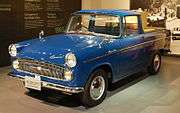Ute (vehicle)

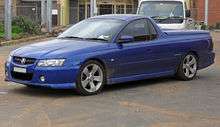
A ute – an abbreviation for "utility" or "coupé utility" – is a term used originally in Australia and New Zealand to describe usually two-wheel-drive, traditionally passenger vehicles with a cargo tray in the rear integrated with the passenger body; as opposed to a pickup whose cargo tray is not integrated with the passenger body. In South Africa the term "bakkie" is generally used, although General Motors in that country now sells the Australian Holden in small numbers there and calls it a ute, while a small front-wheel drive Chevrolet pickup sourced from Brazil and sold in South Africa is called a utility. However, only General Motors uses this terminology.[1]
Etymology
While historically an Australian-designed "ute" has been a 2-door vehicle based on a passenger car chassis (such as the Holden Commodore and Ford Falcon), the term is also used by some in Australia and New Zealand to describe vehicles which would be called a pickup truck or truck in the rest of the world.[2][3]
History
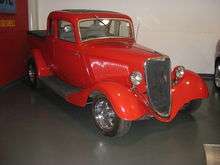
The worlds' first "Closed Cab" Pickup truck was developed by Henry Ford in 1928, and whilst the Ford Model A (1927–1931) Roadster Pickup was produced in the United States from 6 years earlier, Ford is claimed to be the first company to produce an Australian "ute".[4] This was the result of a 1932 letter from the unnamed wife of a farmer in Victoria, Australia asking for “a vehicle to go to church in on a Sunday and which can carry our pigs to market on Mondays”.[4] In response, Ford designer Lew Bandt developed the ute and the model called a "coupe utility" at the time was released in 1934.[4] When the Australian version was displayed in the US Henry Ford Nicknamed it the "Kangaroo Chaser". A convertible version, known as the roadster utility was produced in limited numbers by Ford in the 1930s.[5][6]
In 1951, Holden released a "utility" model, which was based on the 48–215 sedan. With both Ford and Holden now producing utes, this started the long-standing tradition of Australian-designed 2 door vehicles with a tray at the back, based on a passenger-car sedan chassis.[7]
Cultural impact
Australia has developed a culture around utes, particularly in rural areas with events known as Ute musters. It is common, particularly in rural areas, to customise utes in the "B&S style" with bullbars, spotlights, oversized mudflaps, exhaust pipe flaps and UHF aerials.[8] The ute culture has been romanticised by country singers such as Lee Kernaghan, who has written odes to the ute such as She's My Ute, Scrubbabashin, Baptise The Ute and Love Shack.[9]
High performance utes are also sold in Australia, including the FPV F6 and the HSV Maloo, which recorded a top speed of 271 kilometres per hour (168 mph).[10]
|
Australian V8 Utes is a racing series based on lightly modified production Holden and Ford utes.
Four-wheel-drive utes such as the Toyota Land Cruiser are commonly used by emergency services in roles such as fire suppression and road accident response. Farmers often use their 4WD utes as highly mobile fire trucks, these utes are ordinary traybacks with a fire fighting unit that can quickly be slipped on and off by one person, this means that at any bushfire there will usually be tens of "fire units".
Chevrolet
The Chevrolet El Camino is a coupé utility/pickup vehicle that was produced by Chevrolet from 1959 to 1960 and from 1964 to 1987.
Introduced in 1958 (for the 1959 model year) in response to the success of the Ford Ranchero pickup, its first run lasted only two years. Production resumed in 1963 (for the 1964 model year) based on the Chevelle platform. In 1977 (for the 1978 model year) it was shifted to the GM G-body platform. Production finished in 1987.
Although based on corresponding Chevrolet car lines, the vehicle is classified and titled in North America as a truck. GMC's badge engineered El Camino variant, the Sprint, was introduced in 1970 (for the 1971 model year). Renamed Caballero in 1977 (for the 1978 model year), it was also produced until 1987.
In Spanish, El Camino means "the road".
Ford
The ute variant of the Ford Falcon has been in production since 1961. Since the 1999 AU Falcon, the cargo bed has been separate from the cabin, yet it still retains the Falcon sedan front-end and cabin.[11] The cargo bed was separated so that both "utility" and "cab chassis" body styles could be utilized. This separate cab-chassis design challenged the notion that the word "ute" referred to a monocoque body style.
Since 1998, the Ford Courier ute has also been sold in Australia.
|
Holden
From 1951–1968, the "utility" was sold as part of the 48–215 to HR model ranges. [12] From 1968–1984 the "utility" was included in the Holden Belmont/Kingswood range. In 1984, Holden discontinued the ute variant and it was not part of the VB to VL Commodore ranges. The model returned in 1990 based on the VN Commodore chassis and remains part of the model range today. In 2000, the Holden Commodore was the first Australian ute to feature independent rear suspension,[13] the Ford Falcon ute has retained a live axle rear suspension design to this day.[14]
In 2008, the VE Commodore Ute was proposed to be exported to North America as the Pontiac G8 ST. At least one prototype was built, but GM decided not to move it to production because of the current global recession.
|
Chrysler
From 1965–1979 a ute version of the Chrysler Valiant was sold in Australia.
Asian Manufacturers
Nissan
From 1971 till 2008 Nissan sold the Nissan Sunny Truck as a ute in Australia.
The Nissan AD was also built under license in Thailand as the Nissan NV. This was built in a large number of body styles, including coupé utility variants with normal and extended cabs.
Proton
_(front)%2C_Kuala_Lumpur.jpg)
Since 2002, the Proton Jumbuck has been sold in Australia as a ute.
Subaru
_02.jpg)
Perhaps the best known ute produced by a Japanese manufacturer is the Subaru Brumby, a small AWD model derived from the second generation Leone. It was sold between 1978–1993 and known as the BRAT, Shifter, MV, and Targa in countries other than Australia. It is relatively well known due to its long production life and use in popular culture. It was built in Japan, but never sold there.
Suzuki
From 1983 to 1988, Suzuki built a ute version of their Alto kei car called the Mighty Boy. It was sold in Japan, Australia, and Cyprus.
Toyota
Between 1960 and 1970, Toyota sold a ute variant of the second- and third-generation Corona with an integral bed. It was sold alongside its eventual replacement, the Toyota Hilux, for a couple of years before it was discontinued. Toyota also sold a locally produced CKD ute based on the second- and third-generation Crown (also known as S40 and S50), assembled by Australian Motor Industries.
In 2011, the Toyota Hilux was Australia's highest selling ute.[15]
|
South America
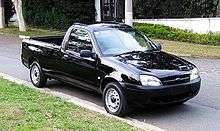
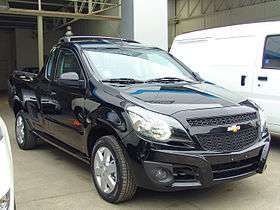
Since the 1970s, utes have been built in Brazil under European car maker badges, usually based in hatchbacks, such as the Ford Courier, based on the Ford Fiesta MkIV. Current examples include the Chevrolet Montana, based on the Opel Corsa and later on the Chevrolet Agile, the Peugeot Hoggar, based on the South American Peugeot 207, the Volkswagen Saveiro, based on the Volkswagen Gol and the Fiat Strada, based on the Fiat Palio.
South Africa
Some re-badged versions of South American utes are sold in South Africa under different names, such as the Chevrolet Montana and the Ford Courier, sold there as Chevrolet Utility and Ford Bantam respectively.
European Manufacturers
BMW
On April Fools' Day 2011, BMW announced the BMW M3 ute/pickup (which was called a "ute" by the Australian media and a "pickup" by the UK and US media).[16][17][18] This vehicle was based on the E93 Convertible and featured a structured aluminum pickup bed and removable targa roof. It was created by BMW's M Division as a one-off workshop transport vehicle for use within the company.[19]
Vauxhall
The Vauxhall Velox utility was sold 1951–1957.
|
See also
- Camper shell
- Car body styles
- Coupé utility
- Flatbed
- Four wheel drive (vehicle)
- Galion Godwin Truck Body Co.
- Kei truck
- List of Pickup trucks
- Panel van
- Pickup truck
- Technical
- Truck
- Truck accessory
- Truck classification
References
- ↑ http://www.carsales.com.au/ute/
- ↑ "Dodge Ram: big US ute set for Australia – CarAdvice".
- ↑ "Used car review Subaru Brumby 1984–1994".
- 1 2 3 Who built the first utility – where – when... Retrieved from www.fastlane.com.au on 1 April 2010
- ↑ http://www.roadsterute.com/index3.htm
- ↑ "PickupTruck.Com – A History of the American Pickup Truck".
- ↑ Short, Mark. "History of the Holden ute".
- ↑ "Landline – 13/10/01: Deniliquin taps into Ute fever . Australian Broadcasting Corp".
- ↑ "Spirit of the Anzacs".
- ↑ "Holden HSV Maloo R8 is World Fastest Ute". Worldcarfans. 2006-07-10. Retrieved 2009-04-25.
- ↑ Hawley, Jonathan (2010-05-28). "The Creation of an Aussie Icon". Drive. Fairfax Media. Retrieved 2010-06-29.
- ↑ "Holden Ute Classics – Classic Holden Cars".
- ↑ http://www.carsales.com.au/advice/2012/commercial/holden/commodore/buying-used-holden-v6-ute-vu-vz-2000-2006-29338
- ↑ http://news.drive.com.au/drive/motor-news/ford-says-new-fg-falcon-ute-has-power-payload-edge-20080509-143x1.html
- ↑ Colquhoun, Steve (14 October 2011). "Best Ute".
- ↑ "2011 BMW M3 ute spotted on Nurburgring – CarAdvice".
- ↑ Lavrinc, Damon. "Officially Official: 420-HP BMW M3 Pickup hauls ass, nearly 1,000 pounds".
- ↑ "BMW's 414bhp M3 pick-up: it's real". 5 April 2011.
- ↑ LaVrinc, Damon (2011-04-01). "420-hp BMW M3 Pickup". Jalopnik.com. Retrieved 2011-04-10.
Bibliography
- Car Exchange magazine article "Ford V8 Mainline Star", June 1981, pp. 76–77.
- Interview with automotive historian Adrian Ryan
- The Good Ole Aussie Ute, Larry O'Toole, ISBN 0-949398-26-8
External links
| Wikimedia Commons has media related to Utes. |
_R8_utility_01.jpg)
_R8_utility_02.jpg)
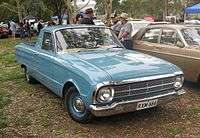
_XL_utility_(2015-06-08)_01.jpg)
.jpg)
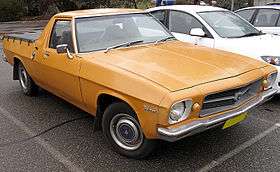
_SV6_Storm_utility_(24991230696).jpg)
